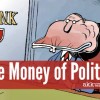Saviour Balzan’s performance at yesterday’s Public Accounts Committee must have been a sight for sore eyes and Lord do we have sore eyes on the island. In many ways Balzan has become the champion of all the “hekk hu go fik” stalwarts who will never get enough of (as Ian Borg put it) getting an […]






